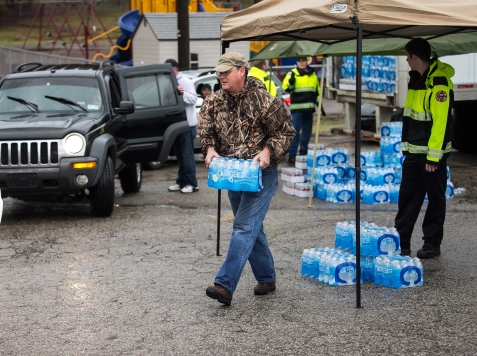On Friday, only two days after federal officials declared the water in the Kanawha-Charleston, West Virginia area to be safe to use, one of the two chemicals that leaked into West Virginia’s Elk River last month, was found in the water supply of George Washington High School in the district. On January 9, 10,000 gallons of crude MCHM, a coal-cleaning chemical, spilled into the Elk River and traveled through roughly 1,700 miles of pipe, The spill occurred barely upstream from the West Virginia American Water utility, from which Charleston gets its drinking water. Crude MCHM can break down into formaldehyde, which causes cancer.
An order was given on January 9 to 300,000 residents in nine counties not to use the water, but 10 days later residents were told it was safe to drink. But reports of water contamination kept being sent to state officials. Yet by Wednesday of this week, Dr. Tanja Popovic, acting director of the National Center for Environmental Health and Agency for Toxic Substances and Disease Registry, said, “You can drink it. You can bathe in it. You can use it how you like.”
Charleston Mayor Danny Jones said:
There is no answer as to when the citizens of this valley and all these nine counties can affect this nightmare to end. And it has devastated this area in a way which is indescribable. Everything is closing. And that means the Marriott Hotel. That means our Town Center Mall. No restaurant is allowed to open because you can’t legally open without water. And it’s been devastating for our area. People are in their homes. The schools are closed. You’re not supposed to take showers and certainly not supposed to drink the tap water,” said Jones.
Andrew Whelton of the University of South Alabama has been chosen to examine the MCHM’s absorption into and removal from plastic drinking water pipes. He said, “One of the concerns in this spill is authorities have little to no information about exactly what this chemical does to drinking water plumbing systems. Chemicals tend to absorb more into plastic pipes than metal pipes. Plastic pipes can act as a sponge, sucking up chemicals.”
Jennifer Weidhaas of West Virginia University is going to measure how much damage the chemical has caused to the drinking water. Andrea Dietrich of Virginia Tech will be looking at how the chemical affected the environment.

COMMENTS
Please let us know if you're having issues with commenting.